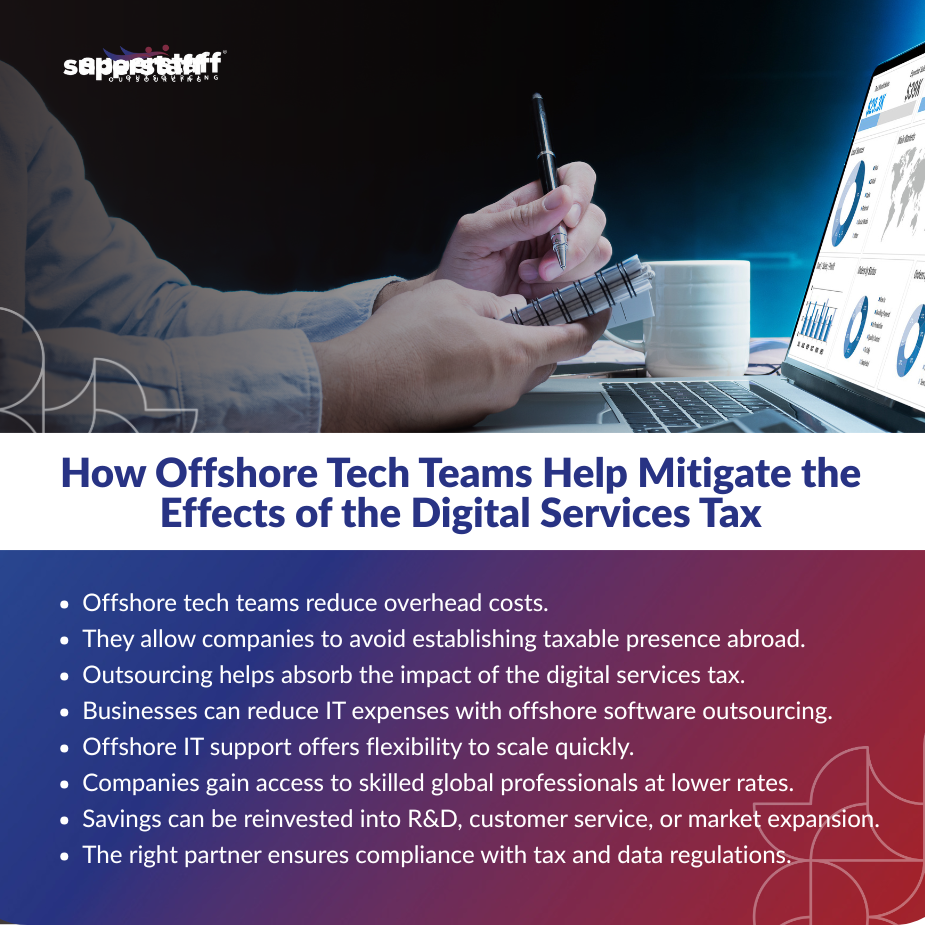
Businesses worldwide are feeling the weight of a growing global trend: the imposition of the digital services tax. Designed to capture revenue from cross-border digital transactions, these taxes are reshaping the financial landscape for companies operating in the tech space. For U.S. and global businesses, especially SMEs and midmarket firms, the impact is significant, adding new layers of complexity and cost at a time when margins are already under pressure.
As governments tighten regulations and expand tax measures, companies are left asking how they can remain competitive without sacrificing innovation. One strategic answer lies in offshore tech outsourcing. By shifting certain functions abroad, businesses can reduce operating costs, access specialized talent, and offset the financial burden of DST while continuing to drive growth.
This blog explores how decision-makers can leverage offshore outsourcing not just as a cost-saving measure, but as a long-term strategy to stay resilient and competitive in an era of mounting digital tax challenges.
The Growing Reach of the Digital Services Tax
Governments worldwide are introducing digital services taxes (DSTs) to capture revenue from cross-border digital transactions. In essence, a DST is a levy placed on revenues generated by digital platforms, cloud-based services, and cross-border tech offerings. The logic behind it is simple: as more of the global economy shifts online, governments want to ensure they can claim a portion of the value being generated within their borders—even if the company providing the service has no physical presence there.
Overview of U.S. and Global Tax Measures
Although the United States has not yet implemented a federal DST, many states are exploring their own digital-specific levies, particularly targeting streaming services, online advertising, and cloud platforms. Abroad, however, DST adoption is widespread and accelerating.
- Europe: France, Italy, and Spain have implemented DSTs ranging between 2–7% of revenues from digital transactions.
- Asia-Pacific: India and Indonesia have introduced their own versions, targeting multinational platforms that derive significant ad and e-commerce revenues locally.
- Latin America: Countries like Mexico and Chile are taxing streaming services and cross-border SaaS providers.
This trend shows no signs of slowing. As digital commerce continues to dominate, more governments are positioning DSTs as a way to level the playing field for local businesses while generating much-needed tax revenue.
Sectors Heavily Impacted
The industries most affected by digital taxation are precisely those driving modern innovation:
- Tech Startups and SaaS Providers: Tech startups face thin margins, and a DST can be the difference between scaling quickly and stalling growth.
- E-Commerce and Digital Platforms: Online marketplaces and gig-economy apps see immediate tax obligations in multiple jurisdictions, raising compliance and operational costs.
- Cloud and Streaming Services: Providers of cross-border IT infrastructure and entertainment content face a growing list of countries demanding a cut of their revenues.
With tax pressures mounting globally, companies cannot afford to absorb these costs indefinitely. Instead, they must explore smarter strategies—like outsourcing—that ease the financial burden without stifling innovation.

Offshore Outsourcing as a Strategic Cost-Saving Measure
Offshore outsourcing is emerging as a practical solution to balance tax compliance with cost efficiency. By shifting certain IT functions, development projects, or digital support abroad, businesses can mitigate the impact of DSTs while maintaining service quality.
Comparative Cost Advantages
The financial benefits are clear. Building and maintaining large in-house tech teams in high-cost countries like the U.S. or Western Europe means not only paying higher salaries but also incurring substantial tax liabilities. Outsourcing reduces overhead dramatically.
For example, a U.S.-based company paying developers an average of $120,000 annually could reduce IT expenses with offshore software outsourcing by accessing equally skilled engineers abroad for a fraction of the cost. This allows companies to allocate savings toward DST compliance without disrupting growth initiatives.
Flexibility Without Increasing Taxable Presence
Another major advantage is flexibility. Outsourcing lets businesses scale quickly—adding offshore IT support teams during peak periods or specialized developers for new projects—without establishing a taxable presence in multiple countries. Since many DST frameworks are tied to having a physical or taxable entity within a jurisdiction, outsourcing provides a compliant workaround.
Beyond cost relief, offshore outsourcing delivers something even more powerful: access to a deep pool of global tech talent.
Accessing Global Talent Without Domestic Cost Inflation
Offshore tech outsourcing doesn’t just help companies cut costs; it opens the door to a world of skilled professionals who can deliver the same (or better) level of expertise as domestic hires.
Global IT Hubs Driving Outsourcing Growth
Two regions stand out for their rapid growth in IT outsourcing services:
- The Philippines: Long recognized for its call center industry, the Philippines has become a thriving destination for software development and offshore IT support. Companies that outsource to the Philippines benefit from a large pool of English-speaking professionals, strong cultural compatibility with U.S. businesses, and overlapping time zones that facilitate real-time collaboration.
- Colombia: As part of Latin America’s growing tech ecosystem, Colombia offers bilingual IT talent, favorable government policies, and geographic proximity to North America. Its cities, such as Medellín and Bogotá, are now hotspots for innovation.
Cost-Effective Labor Markets
Compared to the United States or Western Europe, where tech salaries are climbing steadily, outsourcing markets provide high-quality services at significantly lower costs. For instance, hiring a software engineer in the Philippines can cost 60–70% less than in the U.S., without sacrificing quality.
But outsourcing’s value extends beyond short-term savings—it enables businesses to reinvest in innovation, creating a cycle of growth and resilience.
Reinvesting Outsourcing Savings Into Innovation
The greatest long-term benefit of outsourcing isn’t just cost reduction—it’s what companies can do with the savings.
Funding Core Innovation
Companies that reduce IT expenses with offshore software outsourcing can redirect those funds into:
- Research and Development (R&D): Fueling innovation to stay competitive in a rapidly evolving digital market.
- Customer Experience: Enhancing omnichannel support or introducing AI-powered chatbots without overwhelming internal teams.
- Market Expansion: Entering new geographies while keeping operational costs under control.
With the right execution, outsourcing not only cushions businesses against taxes like DST but also strengthens their capacity to innovate and adapt.
Choosing the Right Outsourcing Partner
While the benefits of outsourcing are clear, success depends on choosing the right partner. Not all outsourcing providers are equal, and decision-makers must ensure alignment with both compliance and operational goals.
Key Factors to Consider
- Compliance with Data and Tax Regulations: An outsourcing partner must have strong data governance and understand the implications of taxes like the digital services tax.
- Proven Track Record: Look for providers with experience supporting global companies in IT, software development, and compliance-heavy industries.
- Scalability: The ability to quickly add offshore IT support teams or specialized developers ensures businesses remain agile as DST policies expand.
Those who act early can secure better partnerships and position themselves ahead of competitors still scrambling to respond to new taxation pressures.
Mitigate the Effects of the Digital Services Tax Through Offshore Outsourcing
The rise of the digital services tax is not a passing trend—it’s a new reality shaping the global economy. For companies in tech, SaaS, and digital platforms, these levies can pose significant risks to profitability. Yet by leveraging offshore tech outsourcing, businesses gain a strategic way to absorb the impact.
Key takeaways include:
- DSTs are spreading worldwide, affecting industries from SaaS to streaming.
- Outsourcing provides cost savings and flexibility while reducing tax burdens.
- Access to global talent through offshore IT support in hubs like the Philippines and Colombia ensures competitiveness.
- Companies that reduce IT expenses with offshore software outsourcing can reinvest in innovation and growth.
- The right outsourcing partner helps ensure compliance, scalability, and long-term resilience.
For midmarket companies and SMEs navigating this landscape, outsourcing is not just a lifeline—it’s a growth strategy. Partner with SuperStaff to unlock cost savings, compliance confidence, and world-class offshore tech support that helps your business thrive despite new taxation challenges.






